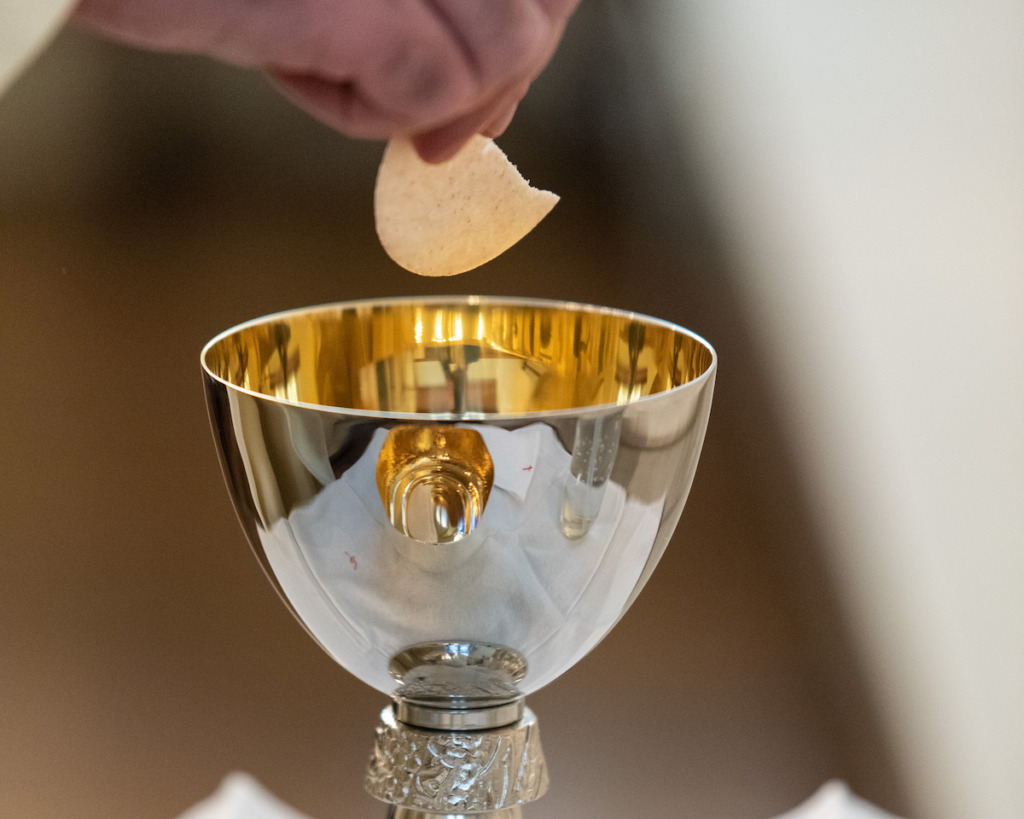“The spiritual journey is one of acknowledging our weaknesses,” said Sister Kateri Mitchell, a Sister of St. Anne, “and journeying towards our strength, which is God, in communion with others.”
On Wednesday, Nov. 9, 2022, Diocese of Richmond employees at the Pastoral Center in Richmond packed into an overflowing conference room to hear a presentation sponsored by the Office of Native American Ministry in celebration of Native American Heritage Month.
Sister Kateri spoke about the relationship between Native American culture and the Catholic faith, specifically regarding devotion to the Eucharist. She is a member of the Turtle Clan of the Mohawk Nation, a matriarchal and matrilineal society of the Iroquois Confederacy.
Sister Kateri began the presentation by recognizing the indigenous communities that exist within Virginia’s borders. Of the seven tribes that are federally recognized in Virginia, only two have designated reservations. One tribe was recognized by a 2015 decision of the U.S. Bureau of Indian Affairs; the six others received federal status under the Thomasina E. Jordan Indian Tribes of Virginia Federal Recognition Act of 2017.
After setting the tone of the presentation with this information, Sister Kateri led the recitation of the Iroquois Thanksgiving Address to show the interconnectedness of relationships within indigenous cultures.
The life of each individual is a series of cycles and relationships, Sister Kateri explained, with the central relationship being between oneself and God. This interconnectedness of life is expanded further: with the Earth, water, plants, animals, medicine and weather. For the Indigenous Catholic, she said, these other forces are not merely in co-existence with humanity; they are companions on the sacred journey to which each of us are called.
Remarking on the lunch provided for participants, Sister Kateri highlighted the connection between the physical nourishment of the meal with the spiritual nourishment of the ministerial discussion, as both are essential for undertaking the sacred journey. Deeper nourishment is provided in the reception of the Eucharist, she explained, and the Christian call is to bring this nourishment received in the sacrament to others.
“The presence of Jesus in our lives needs to reflect and radiate to others,” said Sister Kateri, noting that being present with one another is a form of evangelization that follows the example given by Christ himself.
Something that non-Indigenous people may find surprising, explained Sister Kateri, is that Indigenous cultural gatherings are often very silent. The emphasis is that “your bodily presence is more important than what you say,” she said.
Throughout the presentation, Sister Kateri emphasized how these practices and beliefs are universal, just as, “Catholic means universal.”
Among the commonalities between indigenous culture and the Catholic faith discussed by Sister Kateri, she said that each person is called to their own sacred journey and needs spiritual and physical nourishment to fulfill one’s vocation, regardless of individual culture. She also emphasized sharing meals, the interconnectedness of the human family and the importance of belonging to one another.
In reflecting upon her experience as an Indigenous religious, Sister Kateri said, “The two spiritualities together are so rich, and it is up to us as Indigenous Catholics to embrace both cultures to make us stronger and more able to follow God’s call for our lives.”
Prior to her talk, Sister Kateri honored those gathered with the presentation of a first-class relic of St. Kateri Tekakwitha.
The relic was part of a miracle in 2006, when Sister Kateri placed it on 6-year-old Jacob Finkbonner while he laid in his hospital bed suffering from an infection of flesh-eating bacteria. It was this miracle of healing that led to Pope Benedict XVI proclaiming Blessed Kateri Tekakwitha a saint in 2011, making her the first Catholic Native American saint.

